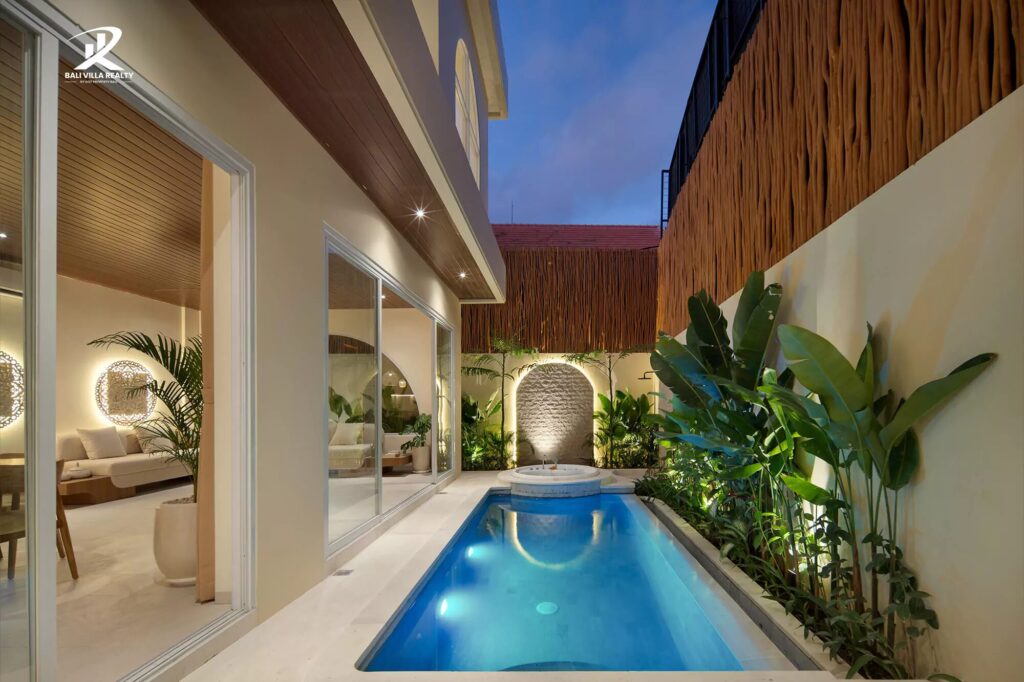An off-plan villa is a property you buy before it’s built. Instead of walking through a finished home, you’re purchasing based on the developer’s plans, 3D renderings or digital designs.
Off-plan property turns out to be a more flexible and cheaper option compared to fully furnished villas. Many foreign investors—especially first-timers—have taken this route to maximize returns (ROI).
But, buying a villa that is not built yet can feel a little confusing.
Luckily, you’re in the right place. This guide will walk you through the full process of buying off-plan property in Bali without any unexpected costs. Let’s get started!
Key Takeaways
- Off-plan villas let buyers invest before construction starts, offering lower prices, flexible payments, and customization options, making them popular among first-time foreign investors.
- Top areas for off-plan investment include Canggu, Uluwatu, Ubud, Umalas, and Seminyak, each offering strong growth potential and lifestyle appeal.
- Smart buying tips: choose trusted developers, review contracts carefully, link payments to progress, and aim for realistic ROI (around 5–8% per year).
Need Bali villa design? Explore Ilot Property’s Award-Winning Bali Architecture Projects
1. Understand Your Ownership Options
As a foreigner, you can’t directly own freehold land in Bali. Instead, you’ll choose from these options:
- Leasehold: You lease the land for a set period (usually 25-30 years, renewable). You don’t own the land, but you have full rights to use it during the lease term.
- Freehold (Through PT PMA): If you plan to use the property for business (e.g., renting it out), you can set up a foreign-owned company (or PT PMA) to legally hold the title.
Read More: How to Buy Property in Bali for Foreigner Safely (2025)
2. Find the Right Property

Now that you know your ownership options, it’s time to search for the perfect property. Here are a few key things to look for:
- Location: Are you drawn to the vibrant energy of Canggu, the serene beauty of Ubud, or the peaceful coastline of Tabanan? Choose a location that fits your lifestyle or rental goals.
- Rental Potential: If you plan to rent it out, look for areas with high demand and year-round tourist traffic.
- Legal Status: Ensure the property is zoned for your intended use, whether that’s residential, commercial, or holiday rentals.
There are a few ways to invest in off-plan villas. You can start by looking for off-plan listings on real estate agency pages, or you can choose to build your own villa from scratch.
Building your own villa is often the best choice if you want something that fully reflects your personality. You can share your ideas directly with the architect and construction team from the very beginning, making sure your villa is built exactly the way you imagine it.

Build Your Dream Villa in Bali Customized for You
With over 20 years of experience helping expats create their homes in Bali, here’s what we do best:
- Design a villa that matches your style, personality, and vision
- Guide you through the entire building process, from start to finish
- Manage your villa long-term to maximize quality and returns
3. Conduct Legal Due Diligence
Before signing anything, hire a legal advisor to conduct due diligence on the property. This includes:
- Land Certificate Check: Ensure the title (e.g., Hak Milik or Hak Sewa) is legitimate and matches the seller’s details.
- Zoning Verification: Confirm the land is zoned for your intended use (e.g., tourism, residential). You can check about Bali land zoning here.
- Tax and Ownership History: Check for unpaid taxes or disputes.
4. Draft and Sign a Secure Agreement

Once the property checks out, your lawyer will draft a purchase agreement. Key elements include:
- Terms of Sale: Price, payment schedule, and property handover details.
- Guarantees: Developer or seller obligations (especially for off-plan properties).
- Penalties: For delays or breach of contract.
Remember that having the right contract is very important. It protects your rights, sets clear expectations, and outlines exactly what you’re paying for—down to the smallest detail.
This helps ensure your investment stays safe, and you don’t face hidden costs or unexpected delays later on.
5. Make Payments Securely

Paying for off-plan developments in Bali often happens in stages. For example:
- Deposit: Usually 10-20% to secure the property.
- Construction Progress Payments: For off-plan project, payments are tied to key milestones (e.g., foundation, roofing, completion).
- Final Payment: The balance upon completion or transfer of the lease.
Always transfer funds through secure and traceable methods. Your legal advisor or notary can guide you here.
6. Secure Necessary Permits
If you’re buying land to build or operate a rental villa, you’ll need permits like:
- PBG/SLF (Building Permit): Required for any construction.
- Pondok Wisata License: Needed if you want to legally rent out your property for short stays.
Let your agent or legal team handle the paperwork to keep things smooth.
7. Transfer Ownership
Once payments are complete and all permits are in order, it’s time to finalize the ownership transfer.
For leasehold or PT PMA structures, this means registering your name or company as the legal holder. Again, your notary will oversee this process and ensure everything is properly recorded.
8. Plan for Ongoing Management
If you’re renting out your property, consider hiring a property management company to handle maintenance, bookings, and tenant communication. They’ll make sure your investment runs smoothly, even if you’re not staying in Bali full-time.
Read More: Managing Your Bali Investment Property from Abroad: Expert Tips
Comparing Off-Plan vs. Finished Property: Which One is Better for You?
Besides off-plan, you can also invest in finished and fully furnished properties. Both options have their own pros and cons, so be sure to understand the difference before choosing:
| Aspects | Off-Plan Property | Finished Property |
|---|---|---|
| Definition | Property bought before construction is completed | Property that is already built and ready to use |
| Price | Usually cheaper than finished properties | Higher upfront cost |
| Customization | Often allows you to choose finishes or make design changes | Limited to renovations after purchase |
| Rental Income | No income until the property is finished | Can generate income right away |
| Risks | Construction delays, developer issues, or market changes during build time | Fewer risks; no delays or surprises during construction |
| Market Value | Potential to grow as the area or market improves | Known market value based on current conditions |
| Tangibility | Hard to visualize until it’s built | You can see and inspect the actual property |
| Payment Terms | Often offers flexible payment plans during construction | Usually requires full payment upfront or a mortgage |
Off-plan property investment is better for those who want lower entry prices, flexible payment terms, and potential value growth over time.
Meanwhile, it’s better to invest in a finished (fully furnished) property if you prefer immediate rental income, lower risk, and the ability to see exactly what you’re buying.
Read More: Pros and Cons of Buying an Off-Plan Villa in Bali
Best Areas to Buy Off-Plan Property In Bali
If you’re looking to buy off-plan property in Bali, focus on the island’s prime investment zones. These are where growth, lifestyle, and ROI meet:
1. Canggu

Canggu has been Bali’s fastest-growing area in recent years—even the pandemic couldn’t slow it down. The FOMO (fear of missing out) often drives buyers here.
As demand rises and land becomes limited, many small developers are launching boutique off-plan projects here.
See Our Villa Listings in Canggu
2. Uluwatu (The Bukit)

Uluwatu, or the Bukit Peninsula, is emerging as Bali’s next Canggu. This place is attracting surfers, creatives, and digital nomads.
Property prices are still more affordable here, and ocean views are often part of the deal. It’s a great spot for early investors before prices catch up.
See Our Villa Listings in Uluwatu
3. Ubud
Known as Bali’s spiritual and artistic hub, Ubud is seeing new off-plan projects pop up around its lush outskirts. Land values have increased steadily, making it ideal for those who want a mix of tranquility, culture, and long-term appreciation.
See Our Villa Listings in Ubud
4. Umalas & Kerobokan

Tucked between Seminyak and Canggu, these areas offer a quieter lifestyle close to all the action.
With limited land still available, more boutique apartments and villas are being developed—especially appealing to expats seeking calm and convenience.
See Our Villa Listings in Umalas and Kerobokan
5. Seminyak & Petitenget
For those who love being near Bali’s top restaurants, luxury resorts, and nightlife, Seminyak and Petitenget remain timeless favorites.
These upscale neighborhoods feature some of the island’s best-designed off-plan projects, perfect for premium rental or personal use.
See Our Villa Listings in Seminyak and Petitenget
Read More: Want to Live in Bali Long-Term? Best Place to Build a Villa
Is It Really Good to Invest in Off-Plan Property?
Yes, buying off-plan property can be a smart move, since one of its advantages is the lower entry price. Here are some main benefits of investing in off-plan Bali villas:
- Lower Purchase Price: Off-plan properties are usually priced below completed ones. This means you can buy early and potentially resell after construction for a strong return—often up to 30% profit within two years.
- Personalized Design Options: You can customize your future home by selecting materials, colors, finishes, fixtures, and sometimes even the layout. This makes your property truly unique and can increase its overall value.
- Flexible Deals from Developers: Many developers provide installment payment plans, early-bird discounts, and even buyer guarantees to encourage investment.
Factors to Consider When Buying Off-Plan Property in Bali
To find the best off-plan properties, keep these key points in mind:
- Developer Reputation: Choose developers with proven experience. Visit past projects and tie payments to real progress.
- Location: Focus on top areas like Canggu, Uluwatu, or Ubud. Check access, noise, and nearby developments before buying.
- Contract Terms: Always review the agreement with a legal expert. Ensure clear timelines, material specs, penalties, and arbitration clauses.
- Payment Plan: Prefer construction-linked schedules. Keep a refundable deposit, and hold back 5% until defects are fixed.
- Warranties & ROI: Negotiate at least a one-year structural warranty. Be cautious of ROI guarantees over 10%—they’re often unrealistic. A more realistic example would be a guarantee of 5–8% per year on the purchase price for about three years
FAQ
1. Can I sell my off-plan property?
Yes, you can. As long as you’ve completed the payment and finalized all the necessary paperwork, there’s nothing preventing you from selling your off-plan property.
2. Can you get a mortgage on an off-plan?
Yes, it’s possible. Most banks release mortgage funds only after the project has reached a certain stage of construction (usually around 50–60%). Once that point is reached, and if you meet the eligibility requirements, you can apply for a pre-approved mortgage to cover the remaining cost.
3. How to calculate ROI on off-plan property?
You can calculate ROI using this formula: ROI = (Annual Profit ÷ Total Investment Cost) × 100
For example, if you purchase a property for AED 1,000,000 and earn a net profit of AED 90,000 per year, your ROI would be 9%. You can also use our free ROI calculator to estimate your property revenue.
Conclusion: Need Help to Invest in Off-Plan Villa Bali?
Now you know how to buy off-plan villa. This investment is worth to consider since it can gives you more profits up to 30%.
With so many off-plan listings out there, finding the right property can feel overwhelming.
To make it easier, you can ask our agents for free recommendations—no need to scroll endlessly or compare listings on your own.
Our agents will also answer any questions you have about off-plan investments, no matter how big or small.
Interested to try? Click the link below to pick a date and book a free, no-obligation call


